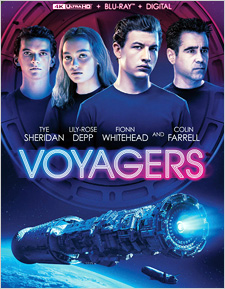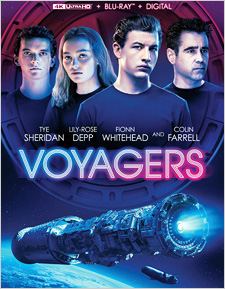Voyagers (4K UHD Review)

Director
Neil BurgerRelease Date(s)
2021 (June 15, 2021)Studio(s)
AGC Studios/Thunder Road Films/Fibonacci Films (Lionsgate Home Entertainment)- Film/Program Grade: C-
- Video Grade: A-
- Audio Grade: B
- Extras Grade: C+
Review
By the year 2063, humanity has ravaged Earth’s biosphere. So scientists send the spacecraft Humanitas on an interstellar voyage to colonize a planet around a nearby star. But as the one-way journey will take eighty-six years, only the grandchildren of those who depart Earth will live to see their destination. For this reason, a group of thirty children are bred from the genomes of Earth’s smartest people, raised in isolation—so they’ve never seen the outside world—and sent on the journey. One of the project’s adult scientists, Richard (Colin Farrell) goes along with them as a kind of mentor. But ten years into the mission, the now teenaged crew discovers that they’re being drugged without their knowledge in order to keep them docile. Naturally, the teens decide to stop taking this dosage. And when their normal hormones, emotions, and personalities begin to emerge for the first time in their lives, their mission begins to go badly wrong.
Written and directed by Neil Burger (The Illusionist, Limitless, Divergent), Voyagers is a frustrating viewing experience. When judging high-concept science fiction, a few key questions must be asked. First, is the story’s science setup plausible, or does it require too many contrivances or conveniences? Second, is the story logically consistent? And most importantly, is it entertaining or engaging? Voyagers fails on all three counts. For example, if humans can build a spaceship this big and advanced with artificial gravity, why can’t they heal the biosphere? (Yes, the ship is rotating, but the axis is wrong—people would be running into the walls due to the Coriolis effect.) Why not colonize Mars, which is much closer? Why not put the crew in suspended animation? Why send only children—and specifically breed them to live their entire lives in a can on a mission they didn’t choose? Why not select idealistic volunteers instead? And why drug them in secret? If these teens are smart enough to run an interstellar space mission, presumably they’d be smart enough to figure out they’re being drugged. The answer to all these question, of course, is: Because then there wouldn’t be a story. (And even so, the story that exists is every bit as predictable as you’d expect.) Voyagers has been called Lord of the Flies in space, and as clichéd as that description sounds, it’s unfortunately right on the money. High concept science fiction is typically much smarter than this.
Voyagers was captured digitally (in 4K resolution) using Sony Venice cameras with Zeiss Supreme Prime spherical lenses and was finished as a 4K Digital Intermediate framed at a 2.39:1 aspect ratio. For its release on Ultra HD, that source was graded for high dynamic range (in HDR10 only). The good news is that the resolution is terrific, with stunning clarity and lots of fine detail. The bad news is, that detail is really only available in faces and hair, because the production design is so stunningly bland, there’s just little opportunity to really appreciate that detail. The HDR adds a bit of vibrance to the palette, but that palette is limited to variations of blue, white, and black, with the occasional splash of other colors. One of the great strengths of science fiction as a cinematic medium is the ability to dazzle the viewer with grand vistas and design. You get none of that here. In the brief moments we actually have the chance to see a striking vista of space… it’s just underwhelming. You can’t fault this presentation’s technical quality; this is an artistic failure.
Primary audio (on both the 4K disc and the included Blu-ray) is offered in English 5.1 Dolby TrueHD. The mix is fine and exhibits good overall clarity, but this just isn’t a film that’s especially demanding of surround play and movement. There are, however, plenty of subtle environmental cues, so the overall sonic immersion is pleasing, and there are a few brief moments where the dynamics and bass get more aggressive. Composer Trevor Gureckis adds an etheral and edgy, yet minimal, score that fuses electronica with more traditional chamber stringed instruments, all presented with fine fidelity. Additional sound options include English Descriptive Audio and Spanish 5.1 Dolby Digital, while subtitles are available in English SDH and Spanish.
Lionsgate’s 4K disc includes the following special features:
- Born for This: The Cast of Voyagers (HD – 11:12)
- Against Type: Unlearning Human Nature (HD – 7:21)
- Survival of the Fittest: The Physicality of Voyagers (HD – 4:38)
- On the Surface: The Visual Style of Voyagers (HD – 9:42)
- Hidden Chambers: Tour the Humanitas (HD – 7:20)
Content-wise, this material is interesting. There’s just not much of it, and again the film itself isn’t terribly interesting. But some of these features are actually revealing. In On the Surface, the director claims the ship design is based on real NASA plans for long-duration space missions, but that’s straight-up nonsense. If that’s what he believes, he’s been misled or failed to do his research. One of his young actors correctly identifies the problem in the same piece: “I remember one of the first scenes we shot, we were in class, all sitting looking at these screens in a bright, bright white room. And by maybe two hours in, a lot of us were like, ‘Can we just take a second and take a breather?’ Like, it hurts your eyes after a while.” Yes, it does. NASA would never send its astronauts on a long-duration mission in a ship this poorly designed—they’d quickly go bananas. Even the Russians paint the insides of their space station modules in warm colors to avoid sterility. Anyway… as mentioned above, the package also includes the film in 1080p HD on a Blu-ray Disc and there’s a Digital Copy code on a paper insert.
Voyagers is the kind of generic, pseudo-smart fare best suited to budget steaming or commercial-heavy cable—more “Syfy” that sci-fi. It’s certainly not Ad Astra bad, but if you’re looking for something the level of 2001: A Space Odyssey, Blade Runner, Alien, or The Matrix, you’re much better off rewatching one of those than wasting your time here. There aren’t many truly great science fiction films out there, but there are quite literally hundreds that are better than this one. Enough said.
- Bill Hunt
(You can follow Bill on social media at these links: Twitter and Facebook)

